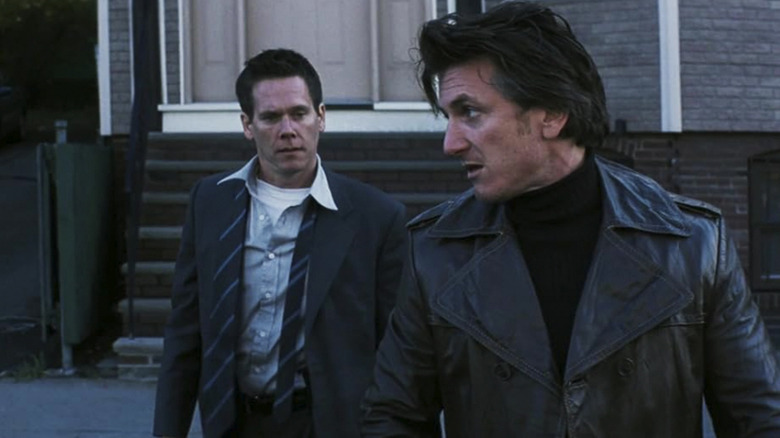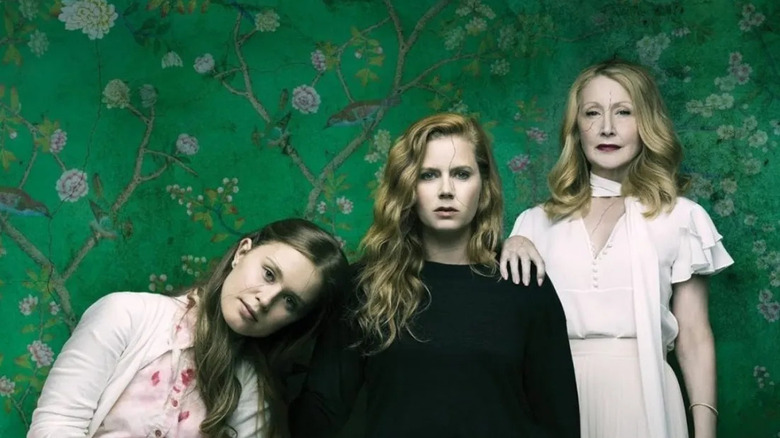This Crime Thriller Novel Became A Clint Eastwood Classic — And Inspired The Author Of Gone Girl
We may receive a commission on purchases made from links.
Dennis Lehane is one of the most respected popular writers working, and Hollywood has been paying close attention to his books for the past 20 years. Not many authors can boast that Martin Scorsese made their book into a movie, but Lehane can thanks to Scorsese's "Shutter Island."
Though hesitant to personally adapt his books into screenplays ("it feels like operating on my own child," he once said), Lehane himself has more than a few credits as a screenwriter. He was part of "The Wire" writers room and developed the 2022 prison drama mini-series, "Black Bird."
The first Lehane movie was 2003's "Mystic River," directed by Clint Eastwood. The movie created quite a buzz, getting six Oscar nominations and netting Sean Penn the Best Actor award. (It understandably lost Best Picture to "The Lord of the Rings: Return of the King.")
Lehane's first novels were a five book run about the Boston private detectives Patrick Kenzie and Angie Gennaro, published from 1994 to 1999. After "Prayers for Rain," he left Kenzie & Gennaro behind (coming back for a wrap-up novel in 2010) and published his first standalone novel in 2001: "Mystic River." He may have left behind his old leads, but not Boston or his themes of how living in that community defines you.
The story has three main characters, all childhood friends: Jimmy Marcus (a retired criminal), Sean Devine (a police detective), and Dave Boyle. When they were kids, Dave was abducted by child molesters and held captive for several days, an experience that pushed them apart and left Dave with still-open wounds. Like Lehane's earlier books, "Mystic River" becomes a murder mystery when Jimmy's daughter Katie is found murdered — after Dave came home the previous night wearing a blood-stained jacket.
Among the fans of "Mystic River" is Gillian Flynn, author of "Gone Girl." She has said that "Mystic River" was her north star when she was writing her first novel, "Sharp Objects." (Like Lehane, Flynn's books have made it to the movies and she's become a part-time screenwriter.)
Would never have written my first novel if it weren't for MYSTIC RIVER. SHARP OBJECTS was just a 100-page mess of themes and thought and Mystic River was truly my moment of epiphany. Psyched to have a conversation with @dennislehane tomorrow at 8:15PM CT. https://t.co/1dkA9WdlL8 pic.twitter.com/oA2UjL7UOD
— Gillian Flynn (@TheGillianFlynn) March 30, 2021
Does Flynn's novels live up to their inspiration? For that matter, do the adaptations of Lehane's books live up to their source material?
Both Mystic River and Sharp Objects follow the scars of abuse
"Sharp Objects" (later made into a 2018 HBO mini-series led by Amy Adams) stars Camille Preaker, a Kansas City reporter with a history of self-harm. When two young girls are found murdered in her Missouri hometown — the fictional Wind Gap — she returns and confronts her emotionally abusive mother, Adora.
Like Lehane did with "Mystic River," Flynn centers her home-state murder mystery around a survivor. After Lehane graduated college, his first job was working with abused and traumatized children, and that experience is why he keeps writing about abused children. Speaking to Boston Magazine in 2015, he recounted:
"It was a major burnout job. And the people who do it, my hats off to them. God bless them, because after a certain point of doing it, I started to really pick up a hair-trigger temper, which I never really had before. You'd see people treating their kids like s*** and you couldn't do anything about it, and you'd carry that anger. I did that for a few years, and then I basically reached a crossroads: I said, 'I think I'd like to channel this in a different way,' and I put it toward the writing. I do think 'A Drink Before the War,' my first book, was a direct result of that job."
"A Drink Before The War" does indeed feature a boy murdering his abusive gangster father, while Patrick Kenzie is shown to have had an abusive childhood too; there's a flashback where he remembers the time his father burned him with a clothing iron. The fourth and most famous "Kenzie & Gennaro" novel, "Gone Baby Gone," follows the disappearance of a neglected young girl and Patrick has to decide whether returning her home is really the best choice. In "Mystic River," abuse is compared to vampirism; the story is about how people who survive still have a perception of being tainted, and how it's sometimes easy for them to abuse others in turn.
"Gone Baby Gone" was the next Lehane book to hit the big screen (directed by Ben Affleck, released in 2007). But frankly, I don't love based-on-Lehane movies quite like I love his novels. Lehane's greatest strength is his prose, not his plotting, and in a visual medium with no inner monologues, you can only experience half of his sharp dialogue. "Mystic River" ropes you in with those characters' inner lives, but the movie feels like it blinks at the darkness the book stares right into. Lehane's writing conveys intimacy and understanding in its depiction of Boston, from neighborhood to neighborhood, and I think the movie needed another native son at the helm. There's a reason Lehane has since put his books in Ben Affleck's hands.
But hey, I'm sure the "Mystic River" movie got more people to read the book, and if that inspired any other talented writers like Gillian Flynn, that's a win.

